
“Crescent Earth from Apollo 4″ by Jason Major. Used with permission.
How is God calling me to respond to our beautiful, broken world? The same way I am asked to do everything else: contemplatively.
“Contemplatively” simply means living out of the reality that we are always in union with God. The apostle Paul said, “In Christ we live and move and have our being.” (Acts 17:28) So, we are not alone in any venture, including this one.
With this in mind, SoulStream (the contemplative Christian community I belong to) expanded our value of justice to include the following:
God being our helper, we will endeavour to:
1. approach our divine call to care for the world positively and lightly, knowing that our response will be a natural outflow of our life in God.
2. become more aware of our own complicity and our own inner landscape in terms of attraction and aversion around responding to the world’s beauty and brokenness.
3. support one another in our community, as we continue to converse about our anguish and helplessness around what we see and allow God to move us into hope.
4. join God in healing the world in ways that are true to our own gifts and limitations.

Night Prayer by Michael Cook. Used with permission.
A few of us had been working on this initiative for months. When we finally got these four statements down on paper and shared them with our community at our annual gathering in June, it helped us all move forward.
Inspired by Michael Cook’s Night Prayer (above) and the Hafiz poem Seed Cracked Open, we have been praying, “God, what love-mischief can ‘We’ do for the world today?”
This is what God, Fred and I have been up to while on vacation in Banff National Park.
Petted a dog and looked into her eyes
Listened to the sounds of creatures stirring in the morning
Instead of disposing of our paper, plastic, metal and glass in the campground garbage bins, we held onto them until we found recycling bins in town
Were saddened by the exhaust of a 4 kilometer long train of vehicles inching down from Lake Louise to the highway and have composed a letter about it to Parks Canada (along with suggesting they include recycling info in their Mountain Guide)
Spoke up for the earth when people were going off-trail and damaging the fragile plants
Encouraged someone who wants to start composting
Applauded my nieces who are doing a month-long simplifying challenge. Each day they will get rid one more thing (i.e. first day one, second day two, etc)
Tried to eat more slowly and bless those who grew the food
Prayed outside with my eyes open
Gave thanks for life around me (although it wasn’t easy when it was perpetually cold and we had even more rain and hail!)
What love mischief have you and God been doing for the world? Let me know. I’d love to include what you’ve been up to in my upcoming posts. Don’t worry if doesn’t seem like much. Wendell Berry says,
“The real work of planet saving will be small, humble, and humbling, and (insofar as it involves love) pleasing and rewarding. Its jobs will be too many to count, too many to report, too many to be publicly noticed or rewarded, too small to make anyone rich or famous.”
© Esther Hizsa, An Everyday Pilgrim, 2015.
This is the last of four posts by Esther Hizsa.
 Esther Hizsa is a spiritual director, retreat speaker and writer. She is a member of SoulStream contemplative community and helps facilitate their Living from the Heart course. She and her husband, Fred, live in Burnaby, B.C.They have two married children and two grandchildren. She blogs at An Everyday Pilgrim where this was originally published.
Esther Hizsa is a spiritual director, retreat speaker and writer. She is a member of SoulStream contemplative community and helps facilitate their Living from the Heart course. She and her husband, Fred, live in Burnaby, B.C.They have two married children and two grandchildren. She blogs at An Everyday Pilgrim where this was originally published.
Unauthorized use and/or duplication of this material without permission from Esther Hizsa is strictly prohibited.
Despite all evidence to the contrary,
God will accomplish God’s purposes in Christ.
This bold statement, based on Ephesians 1:10 and Colossians 1:19-20, expressesSoulStream community’s core value of hope. My experience in the Valley of Dry Bonesechoed this hope. Despite evidence to the contrary, God is renewing the earth.
“Well,” the Spirit of the Lord said to me, “shall we move forward?”
Yes, indeed. I liked the sound of “we.” It reminded me of the last line of the Hafiz poemSeed Cracked Open: “God, what love mischief can ‘We’ do for the world today?”
So I paid particular attention to what God was doing and looked for how I was being invited to join God in some “love mischief.”
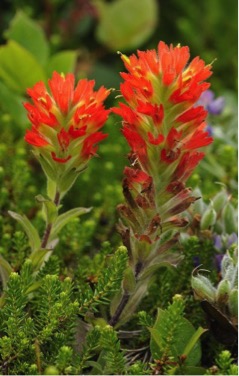
We were camping in Banff National Park in Alberta. The day after we arrived, Fred and I hiked along Mosquito Creek toward Molar Pass. We were awestruck at every turn. Indian Paintbrush in shades of coral, ruby and magenta, snow-covered peaks, and rushing glacial streams reflected God’s beautiful handiwork.
Meanwhile the tedious, temperamental weather inspired a new version of the Hokey Pokey. It goes like this:
You take your rain gear off,
you put your rain gear on,
you take your rain gear off,
and then you shake it all about.
You give thanks for the sunshine
and you give thanks for the rain.*
That’s what it’s all about.
*Verse 2 insert “snow”; Verse 3 insert “hail”.
If it were up to me, I would choose warm weather with endless sunshine every time. But our land was in dire need of rain. Forest fires were burning all over British Columbia and into Alberta two hundred kilometers from where we camped. So I was thankful for precipitation in any form it came.
Giving thanks for all God’s gifts, including the rain, seems insignificant in the scheme of things (especially when I have a husband who knows how to put up tarps). But according to Pope Francis, it’s an essential part of my conversion if I’m going to help God save the earth.
So what [some Christians] need is an ‘ecological conversion,’ whereby the effects of their encounter with Jesus Christ become evident in their relationship with the world around them. Living our vocation to be protectors of God’s handiwork is essential to a life of virtue; it is not an optional or a secondary aspect of our Christian experience. . .
This conversion calls for a number of attitudes which together foster a spirit of generous care, full of tenderness. First, it entails gratitude and gratuitousness, a recognition that the world is God’s loving gift, and that we are called quietly to imitate God’s generosity in self-sacrifice and good works . . .
— Encyclical Letter, Laudato Si’ of the Holy Father Francis on Care for Our Common Home, May 2015 (#217,220)

Credits and references
“Indian Paintbrush” by Bureau of Land Management Oregon and Washington. Used with permission.
“Camping in Mosquito Creek Campground, Banff” by Fred Hizsa. Used with permission.
© Esther Hizsa,
This is the third of four posts by Esther Hizsa.
 Esther Hizsa is a spiritual director, retreat speaker and writer. She is a member of SoulStream contemplative community and helps facilitate their Living from the Heart course. She and her husband, Fred, live in Burnaby, B.C.They have two married children and two grandchildren. She blogs at An Everyday Pilgrim where this was originally published.
Esther Hizsa is a spiritual director, retreat speaker and writer. She is a member of SoulStream contemplative community and helps facilitate their Living from the Heart course. She and her husband, Fred, live in Burnaby, B.C.They have two married children and two grandchildren. She blogs at An Everyday Pilgrim where this was originally published.
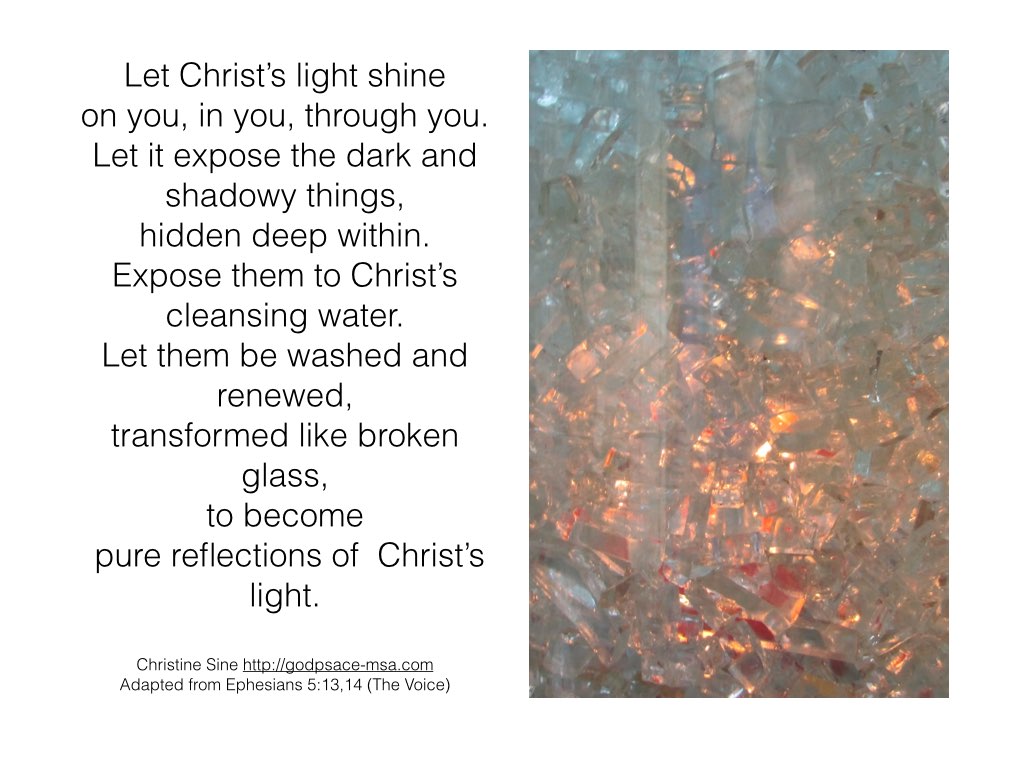
When the light shines, it exposes even the dark and shadowy things and turns them into pure reflections of light. (Ephesians 5:13, 14 The Voice)
A couple of weeks ago I asked for suggestions on how to use the broken glass created by the vandalism to our property on Camano Island. One simple suggestion was to get two glasses, that could be placed inside each other with broken glass between them to create a candle holder. We were inspired by this idea, and used it as the basis for one of our liturgical exercises at the Celtic retreat this weekend.
My first experiment was interesting but also disconcerting in some ways. I cleaned out a couple of vases and dribbled the glass between them, placed a candle in the centre and let the light shine through.
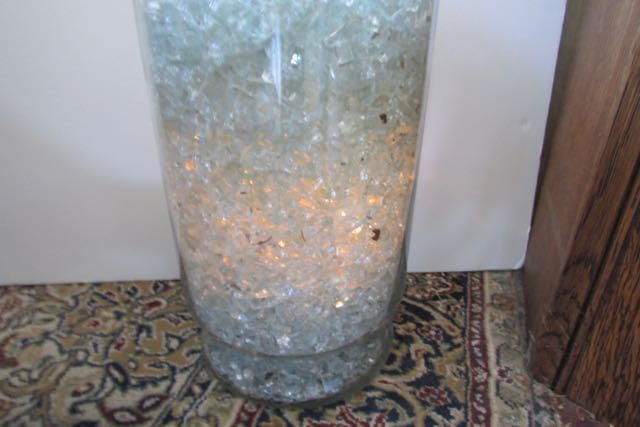
I was horrified by how many impurities there were in my collection of glass, imperfections that I was not aware of until I lit the candle. Dirt, seeds, leaves and sticks suddenly came to life.
There is a big difference between brokenness and impurity I decided and it is only when God’s light shines through that we become aware of the difference. Brokenness can be used to reflect God’s light, the impurities just need to go.
What is your response?
Sit quietly and think about your own life. What do you think is the difference between brokenness and impurity? In what ways has God’s light shone through your life so that you can distinguish the difference? What has been your response to this?

So I washed the glass fragments and laboriously picked out the seeds and leaves. The fragments were transformed.
They no longer looked dull and lifeless, they now glowed with a rainbow of colours. When I lit the candle the light was even brighter and its red colour shone through. Yes some of the impurities remained, it was almost impossible for me to get out all the dirt and leaves, but the light shining through made it easier to distinguish what still needed to be removed, and now I could see the true colours of the light within.

What is your response.
Sit quietly again and think about the places in which God’s light shines most brightly in your life. What impurities are you still aware of that need to be removed? In what ways has the cleansing process God has taken you through revealed those? It what ways has this process allowed the true colours of God’s light to shine through? How does God want you to respond in order to continue the cleansing process?
Now listen to this video. Is there any further response God would ask of you at this time?
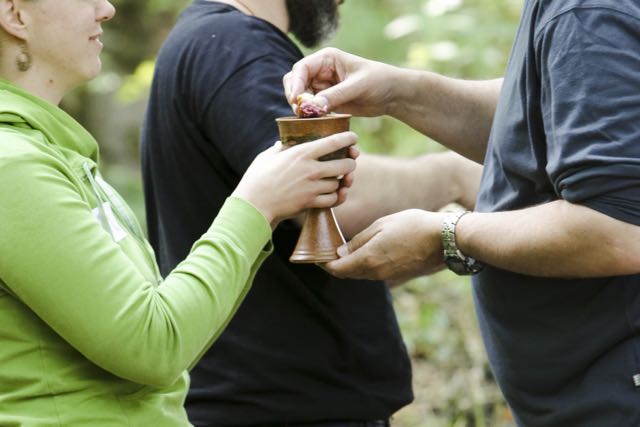 Lord today has shown us
Lord today has shown us
That you are able to transform all things.
Wholeness emerges from brokenness,
Painful endings give rise to new beginnings,
Life is born out of death.
Lord you are the way, the truth and the life,
From brokenness you bring wholeness,
From painful endings you bring new beginnings,
From death you give birth to life.
Our hope is in you who transforms all things.
This morning we placed objects on the altar as symbols of God’s desire for reconciliation and ability to transform brokenness into wholeness. Our day has taught us new things about reconciliation and renewal. It has given us new companions, stirred within us a sense of the journey of reconciliation God calls us to. What are the new things you take with you today as preparation for the journey ahead?
(Pause for a time of sharing)
Children share and present their gifts
Adults share the gifts they want to bring to this final celebration feast.
God as we stand in this place of hope, looking forward to renewal and transformation we pray together with Columba:
Lord of our hearts, give us vision to inspire us,
that, working or resting, we may always think of you.
Lord of our hearts, give us light to guide us,
that at home or abroad, we may always walk in your way.
Lord of our hearts, give us wisdom to direct us,
that, thinking or acting, we may always discern right from wrong.
Lord of our hearts give us courage to strengthen us,
that amongst friends or enemies, we may always proclaim your justice.
Lord of our hearts, save us from empty praise,
that we may always boast of you.
Lord of our hearts, save us from military prowess,
that we may always seek your protection.
Lord of our hearts, save us from vain knowledge,
that we may always study your word.
Lord of our hearts, save us from unnatural pleasures,
that we may always find joy in your wonderful creation.
Lord of our own hearts, whatever may befall us,
rule over our thoughts and feelings, our words and actions.
Song – Be Thou My Vision
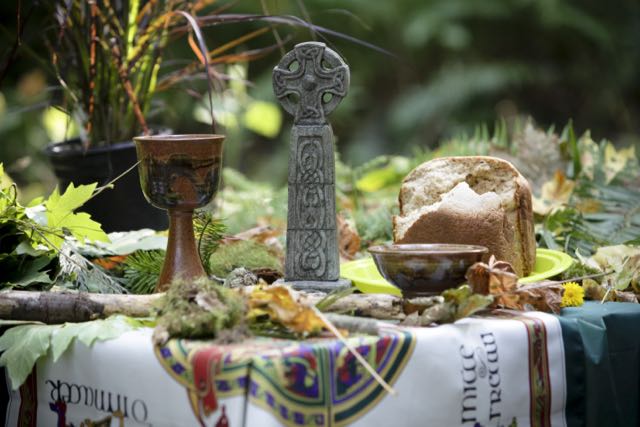
The Eucharist – The Great Thanksgiving
Now as we come to the communion table, let us welcome, as Columba did, all the ones God sends to feast with us. This table is for all those who love Christ and want to love him more. It is for those who have tried to follow, those who have failed and those who have never followed. Let us come remembering those desperate for God’s forgiveness and reconciliation, those who have hurt us, the marginalized, the sick and the abandoned. At this table we all meet together to enjoy this foretaste of God’s eternal banquet feast.
God, thank you for your spirit breaking down barriers within and without,
Barriers that distort our ability to lead a life fully integrated with you and your ways,
Forgive us for the times we have deliberately resisted the Spirit’s work.
Life giving spirit, God’s advocate and guide, have mercy on us.
Forgive us God, for the barriers we create within ourselves,
Barriers that resist your healing work and prevent us moving toward wholeness,
Forgive our self-centerdness, our anger, our fear of change, our lack of trust in your love.
Life giving spirit, God’s advocate and guide, have mercy on us.
Forgive us God, for the barriers we create between us and you,
Barriers that separate us from your love and the assurance of your salvation.
Forgive our busyness, our independence, our desire to go our own way.
Life giving spirit, God’s advocate and guide, have mercy on us.
Forgive us God, for the barriers we create between us and each other, Barriers that separate us from neighbours near and far and inhibit mutual love and care.
Forgive our resentment of others, our love of control, our indifference to the poor.
Life giving spirit, God’s advocate and guide, have mercy on us.
Forgive us God, for the barriers we create between us and your beautiful creation,
Barriers that abuse your world and deny our responsibility as stewards.
Forgive our greed, our misuse of resources, our pollution of the environment.
Life giving spirit, God’s advocate and guide, have mercy on us.
God, by the power of your spirit, free us and break down these barriers.
Turn us away from the bondage of a life lived for ourselves and our own desires,
May your spirit guide us into the freedom of life lived for you and your purposes.
Life giving spirit, God’s advocate and guide, have mercy on us.
An Affirmation of Faith
We believe and trust in God our creator,
Who made us to be neighbours together,
Reconciled with brothers and sisters from every nation and culture.
We believe and trust in Christ our redeemer,
Who saves us from self-centeredness and isolation,
To be joined together as parts of one body,
That loves and cares for each other.
We believe and trust in the Holy Spirit our enabler,
Who restores us to be one family,
With the rich, the poor, the disabled and the whole.
With the young, the old, the oppressed and despised.
We believe and trust in God,
Who welcomes us home into the eternal world,
Where justice and love will reign forever.
We believe and trust in God’s new world coming,
Where one day together with sisters and brothers from all nations,
We will be healed and made whole to become all that God intends us to be.
Let us gather around the table with God’s gifts of bread and wine.
Eternal Spirit, Earth-maker, Pain-bearer, Life-giver,
Source of all that is and that shall be,
Father and Mother of us all. Loving God, in whom is heaven.
The hallowing of your name echoes through the universe!
The way of your justice be followed by the peoples of the earth!
Your heavenly will be done by all created beings!
Your commonwealth of peace and freedom sustain our hope and come on earth.
With the bread we need for today, feed us.
In the hurts we absorb from one another, forgive us.
In times of temptation and test, spare us,
From the grip of all that is evil, free us.
For you reign in the glory of the power that is love, now and forever. Amen.
Forgiving and redeeming God, through your goodness we have this bread and wine to offer. It is given from the earth, a symbol of your hospitality. It was made by human hands to be shared as Columba did, with love and generosity. In this we are reminded of and celebrate together the life that Jesus shared among his community throughout the centuries and shares with us today.
Living among us, Jesus loved us. He broke bread and shared hospitality with outcasts and sinners, healed the sick and proclaimed good news to the poor. He yearned to draw all the world to himself yet we were heedless of his call to walk in love and forgiveness.
On the night before he died Jesus shared a meal with his friends. He took bread, gave thanks to God, broke it and gave it to them saying: Take, eat, this is my body, which is given for you. Do this in remembrance of me.
As supper was ending, Jesus took the cup of wine. Again he gave thanks to God, gave it to them, and said: Drink this, all of you. This is my blood of the new covenant, which is poured out for you and for all for the forgiveness of sins. Whenever you drink it, do this for the remembrance of me.
Now gathered at your table, O God of all creation, and remembering Christ crucified and risen, who was and is and is to come, we offer to you our gifts of bread and wine, and ourselves, a living sacrifice.
Pour out your Spirit upon these gifts, that they may be the body and blood of Christ. Breathe your Spirit over the whole earth and make us your new creation, the body of Christ given for the world you have made.
In the fullness of time bring us, Columba, Brigit and all your saints from every tribe and language and people and nation, to feast at the banquet prepared from the foundation of the world.
Through Christ and with Christ and in Christ, in the unity of the Holy Spirit, to you be honor, glory and praise, for ever and ever. Amen.
Alleluia, We break this bread to share in the body of Christ.
We who are many are one body, for we all share in the one bread. Alleluia.
The Invitation
Draw near and receive the body and blood of our Saviour Jesus Christ in remembrance that he died for us. Let us feed on him in our hearts by faith with thanksgiving.
All are welcome at the Lord’s Table to receive holy communion. Children are welcome at parental discretion. Receive the consecrated bread in the open palm of your hand and assist the chalice bearer by guiding the cup to your lips, or if you prefer dip the bread into the cup and then eat it.
Post Communion Prayer
Gracious God in the bread and the wine
we have been given a foretaste of your eternal banquet.
We have seen the power of your forgiveness,
Experienced the wonder of your redemption,
And been nourished by faith, hope and love,
Send us out in the power of your Spirit,
to live and work to your praise and glory.
We ask this in Jesus’ name
The Blessing
As Columba lay dying in the community of Iona he wrote the following prayer:
See that you be at peace among yourselves, my children, and love one another.
Follow the example of good men of old, and God will comfort you and help you,
both in this world and in the world which is to come.
Let us go from this place determined to follow the example that Columba and so many others of God’s saints throughout the ages have set for us:
Let us go in the reconciling spirit of Columba.
May the fire of God’s love
burn brightly and steadfastly in our hearts.
May Christ be like a bright flame before us,
A guiding star above us,
a smooth path beneath us.
And a kindly shepherd behind us,
Today and forever more.
Amen.
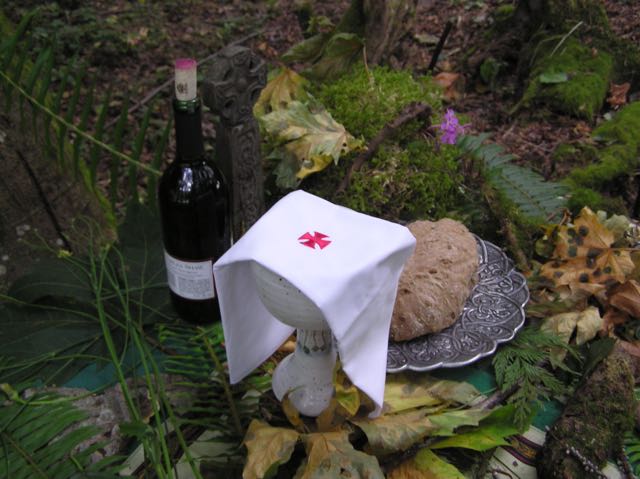
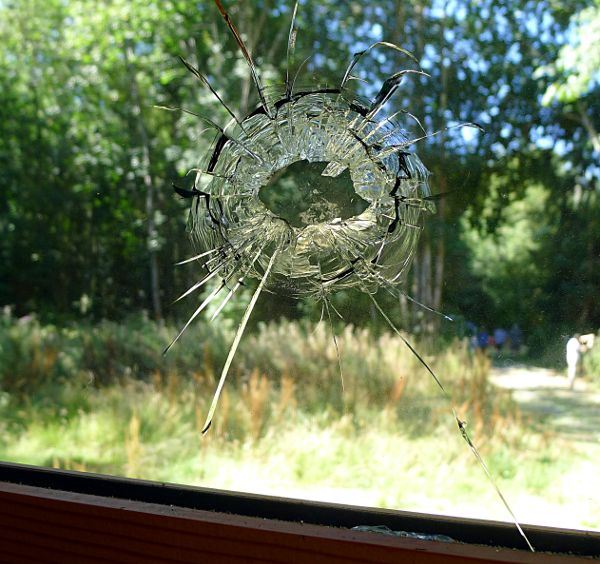
The potential for violence lies within all our broken hearts and lives. There are hidden places within all of us, where we need to be reconciled to God’s desire for peace and wholeness. There are broken relationships that need to be repaired, destructive tendencies that should be repented of.
How do we respond in the face of this violence within ourselves and within our world? Loving when others despitefully use us, seeking for peace when our natural response is either to run away and pretend it is not happening or to join in. We fight violence with violence.
What is the correct Christian response?
We look to the Celtic saints, specifically to Columba of Iona for guidance. He was a man for our times – a negotiator, a reconciler and a peacemaker who faced many similar problems to the conflicts in our world today. Columba bridged a gap between the fledgling Christian culture and the pagan, druidic culture of his time. As a young man he too fought violence with violence, and must have struggled with his own need for repentance and inner restoration. The wisdom of life and his sacred calling as a monk taught him the power of peace and reconciliation.
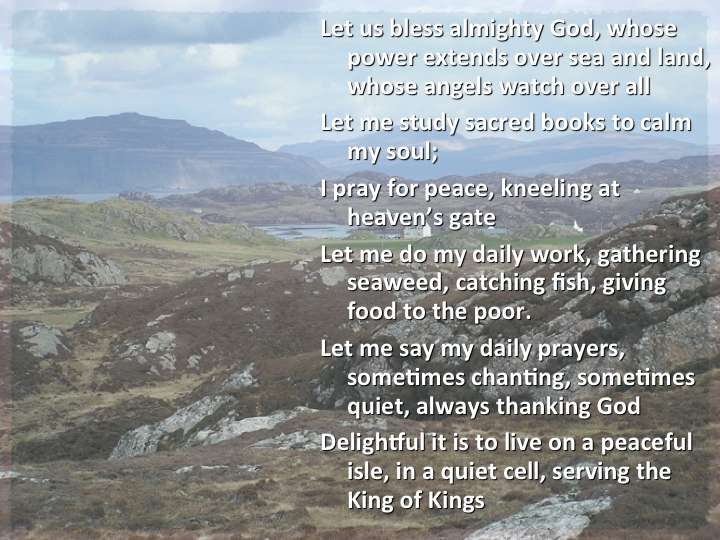
Columba teaches us that the response to violence begins not with action but with listening. So let us join Columba in the reciting of this prayer which he wrote and open ourselves to receive from God as we listen through the scriptures.
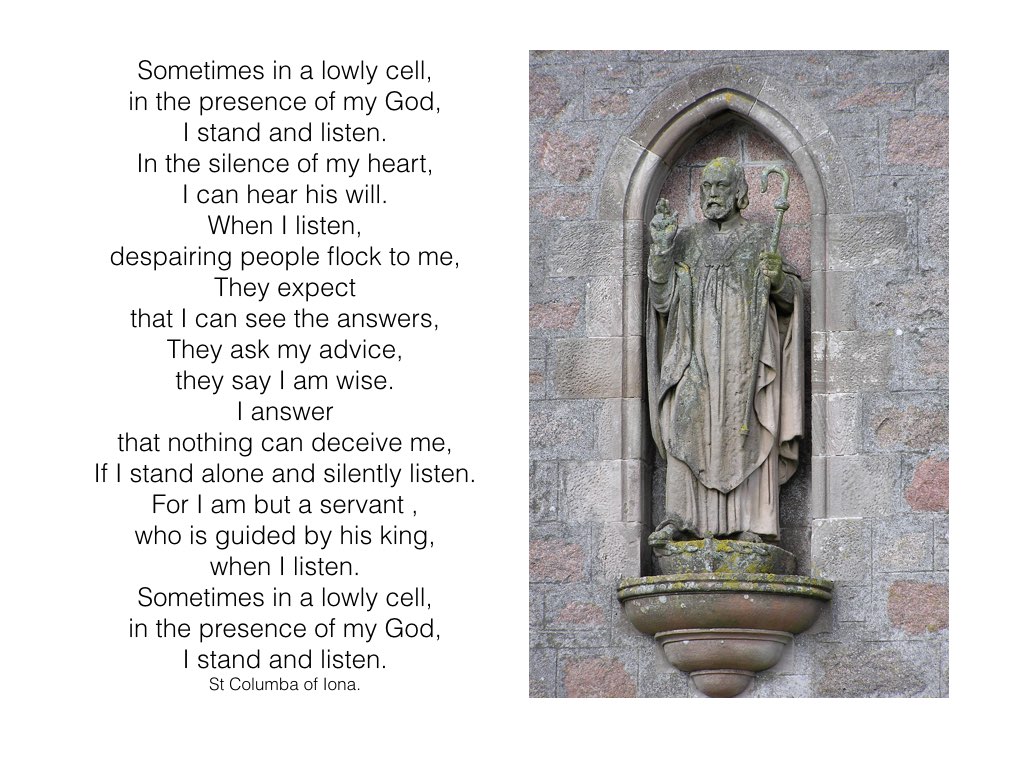
Come into God’s presence and listen for God’s wisdom in the silence of your heart as we read through the scriptures and apply the practice of Lectio Divina to them. Ask God where you need to be reconciled. Are there inner places of reconciliation in the depths of your heart that God brings to mind? Are there promptings towards reconciliation with God, others or God’s world?
Listen, not just to the response of your own spirit and its need for restoration, but also for the pain that has created this violent response within the perpetrators. Are there ways in which our actions or inactions have contributed to the violence? Above all let us listen to the voice of God’s reconciling spirit calling us to forgiveness and healing.
Introduction to Lectio Divina
This is a very ancient contemplative prayer technique practiced at one time by all Christians and kept alive by the monastic tradition. It draws us into the presence of God and enables us to discover an underlying spiritual rhythm in our daily life.
Lectio divina begins with cultivating the ability to listen deeply, to hear the still, small voice of God. Get comfortable and clear your mind of mundane thoughts and cares. Become silent. You may find it helpful to concentrate by beginning with deep, cleansing breaths or reciting a short prayer over and over to help free your mind.
Lectio – reading/listening or settling and shimmering: Lectio is reverential listening; listening both in a spirit of silence and of awe. Settle into your prayer space, let go of distractions and open yourself to the experience of prayer. Read through the text slowly several times, attentively, gently listening to hear a word or phrase that beckons and shimmers as God’s word for you today.
Meditatio – meditation or savouring and stirring: Read the text again and take time to savour the word or phrase that shimmers by allowing it to unfold in your imagination. Be aware of the memories and images it evokes. Allow it to interact with your inner world of concerns, memories, and ideas. Dialogue with God. Through meditatio we allow God’s word to touch us and affect us at our deepest levels.
Oratio – prayer or summoning and serving: Respond to the passage by opening you heart to God. Listen for how the things that have been stirring within you connect to some aspect of everyday life. Prayer arises spontaneously as we allow our hearts to be touched by this entering of God into our experience. Enjoy a conversation with the One who has invited you into a loving embrace. Offer to give God your thoughts and reflections and invite God to use the scripture to change you.
Contemplatio – contemplation or slowing and stilling: Slow yourself down and rest into the still presence of God. Free yourself from your own thoughts. Open your mind, heart and soul so that you can hear God speak to you. Sit in silence, letting go of our own words enjoying the experience of being in the presence of God. Offer gratitude for God’s presence and enjoy what God is doing and saying to you. You may like to write down what you feel God is saying to you.
(Ring the singing bowl)
Scripture Readings
2Corinthians 5:16-21 (NLT)
So we have stopped evaluating others from a human point of view. At one time we thought of Christ merely from a human point of view. How differently we know him now! This means that anyone who belongs to Christ has become a new person. The old life is gone; a new life has begun!
And all of this is a gift from God, who brought us back to himself through Christ. And God has given us this task of reconciling people to him. For God was in Christ, reconciling the world to himself, no longer counting people’s sins against them. And he gave us this wonderful message of reconciliation. So we are Christ’s ambassadors; God is making his appeal through us. We speak for Christ when we plead, “Come back to God!” For God made Christ, who never sinned, to be the offering for our sin,[a] so that we could be made right with God through Christ.
Colossians 1:15-20 (The Voice)
He is the exact image of the invisible God, the firstborn of creation, the eternal. It was by Him that everything was created: the heavens, the earth, all things within and upon them, all things seen and unseen, thrones and dominions, spiritual powers and authorities. Every detail was crafted through His design, by His own hands, and for His purposes. He has always been! It is His hand that holds everything together. He is the head of this body, the church. He is the beginning, the first of those to be reborn from the dead, so that in every aspect, at every view, in everything—He is first. God was pleased that all His fullness should forever dwell in the Son 20 who, as predetermined by God, bled peace into the world by His death on the cross as God’s means of reconciling to Himself the whole creation—all things in heaven and all things on earth.
Regathering Song
The monastery of Iona, like those previously founded by Columba in Ireland, was not a retreat for solitaries whose chief object was to work out their own salvation; it was a great school of Christian eduction, and was specially designed to prepare and send forth a body of Christ followers trained to the task of preaching the Gospel among the Scottish tribes. It became a centre for art, music, and education that helped preserve Christian culture during the dark ages.
Columba’s reconciling influence was very great with the neigbouring tribal kingdoms, and the leaders often applied to him for advice, and submitted to him their differences, which he frequently settled by his authority. He established monastic learning centers throughout Scotland that continued his influence for many years.
Our prayer is that this property too may become known as a place of learning, training and reconciliation. May God give us the wisdom to build and the discernment to form the type of community that can have the same influence that Columba did.
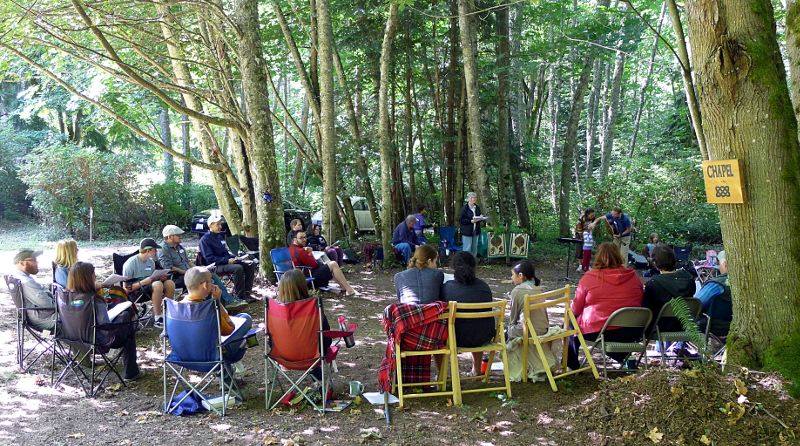
Celtic retreat gathering – photo Andy Wade
Song
High King of Heaven,
Almighty Father of us all,
as your servant Saint Columba
established a community built on love and trust,
so grant that in all humility
we may be your hands and your voices here on earth,
working to build up the community of faith,
a place of learning and reconciliation.
In the name of your Son,
our Saviour Jesus Christ.
Amen.
Grace for Potluck Lunch.
May the blessing of the five loaves and the two fishes,
Which God shared out among the five thousand, be ours.
May the King who did the sharing ,
bless our sharing and our co-sharing.
The blessings of God be upon this place,
With plenty of food and plenty of drink,
With plenty of beds and plenty of ale,
with much riches and much cheer,
With many kin and length of life ever upon it.
Amen.
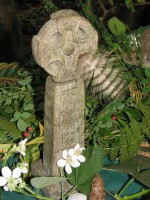
——————————————————————————-
This is second of two posts of the litany for MSA’s 24th Annual Celtic retreat
Enjoy!
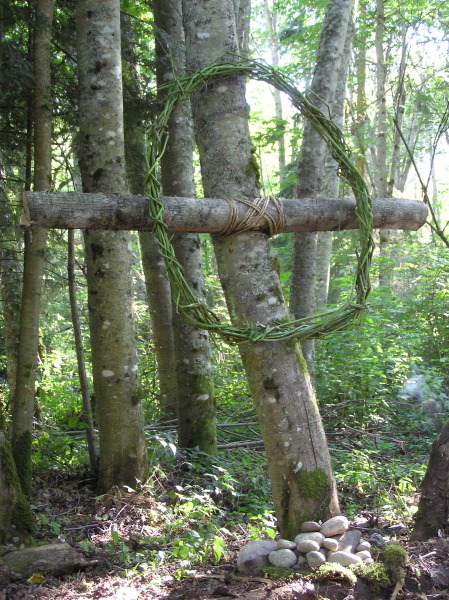
Tomorrow I head up to Camano Island for our annual Celtic retreat. I am aware that many of you are too far away to attend and thought that some of you might like to enjoy us for the day with us at least in spirit, by using the same prayers and meditations that we will be using. Today I am posting the first part of our liturgy, tomorrow the second and on Saturday the afternoon prayers. You will recognize some of the prayers and photos from blog posts earlier in the year – enjoy.
—————————————————————————————–
God believes in reconciliation that is our strong affirmation as we begin our retreat today. Yet we are broken people. All of us need to be transformed – our hearts, our minds, our relationships to God, to each other and to God’s good creation need to be brought to wholeness so that all that we are and all that we do is aligned with God’s vision for Shalom.
Today we seek that reconciliation, asking God to continue the work of transformation in our hearts and lives, as well as into our situations: here on this land as well as those we face at home and throughout the world. Let us start by welcoming God into this place and this process.
(Ring the singing bowl)
Welcome, Lord, welcome,
Welcome into this day,
Pregnant with new possibilities.
Welcome, Lord, welcome,
Welcome into our hearts,
Awakening to the divine presence.
Welcome Lord, welcome,
Welcome into our lives,
Creating together wholeness and shalom.
(Silence)
Most of you know that our beautiful building, on this site has been vandalized. All the windows and doors have been smashed, not once but twice. We are devastated. We have had vandalism before but usually nuisance interference. This is the first time it has been malicious and deliberately destructive. What would a gospel reconciler do? That is the question that revolves in our minds and hearts today as we gather both to celebrate and to seek the wisdom of God in our path towards reconciliation and wholeness. We ask it not just for this building but for all the places in our hearts and our lives where reconciliation is needed.
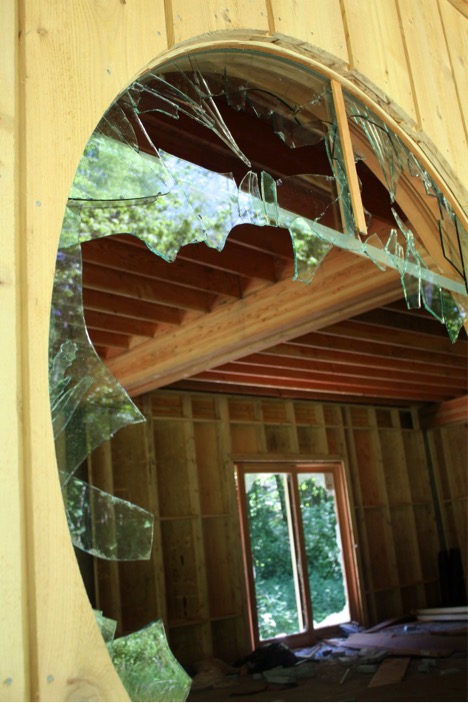
As we look around at the brokenness of this building and consider the brokenness of our own lives, I am reminded of Loa Tzu’s words: “New beginnings are often disguised as painful endings…”
In the midst of painful endings,
in the midst of brokenness and heartache,
may we seek to love and not to hate,
may we seek for peace not for war,
may we see God’s new beginnings emerge
for ourselves, for this place, for God’s world.
(Ring the singing bowl)
Welcome, welcome, welcome.
Welcome to this beautiful place,
violated yet resilient.
Welcome to the fellowship of friends,
saddened yet hopeful.
Welcome to the presence of God,
faithful and compassionate.
Let us welcome everything that comes to us today.
It is for our healing.
It is for the healing of relationships,
It is for the healing of this land.
Let go,
Let go of your desire for power and control,
God’s ways are higher than ours.
Let go of your desire for retribution and punishment,
In God alone will we trust.
Let go of your desire to change what has happened,
God’s ways are faithful and true.
Let us release all that binds us.
It is for our healing,
It is for the healing of relationships,
It is for the healing of this land.
Open yourself,
Open yourself to the loving presence of God,
In us, around us, above and behind.
Open yourself to God’s action within you,
Healing, restoring, making whole.
Open yourself to God’s action in this place,
Transforming, renewing, bringing shalom.
Let us open ourselves to God.
It is for our healing,
It is for the healing of relationships,
It is for the healing of this land.
Amen.
(Ring the singing bowl)
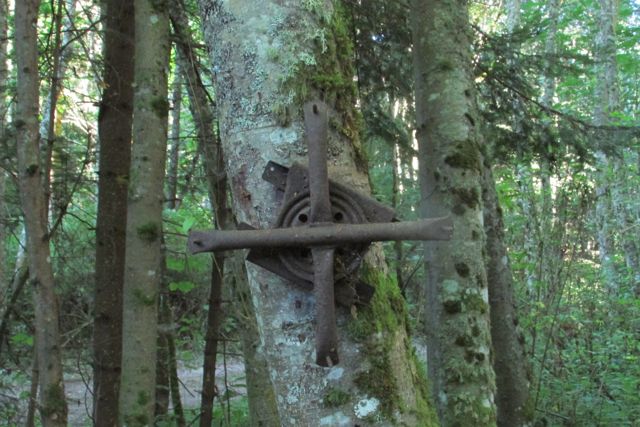
Instructions for preparing the Altar
Now it is time to prepare an altar for our worship. At the end of last year’s retreat, as Andy Wade and I talked about the vandalism which began with the destruction of our Celtic cross several years ago, I walked behind the altar, and there in the grass was a rusty old piece of junk that looked just like a Celtic cross. For me it was a symbol of hope – a sense that God says to us Garbage into gold. I can redeem and make new all that is created.
So as we go out to gather items to place on the altar, consider the question: What would a gospel reconciler do? Gather items that can be for all of us symbols of hope, restoration, reconciliation and shalom, for your own heart and life, for situations you face at home, or for this land.
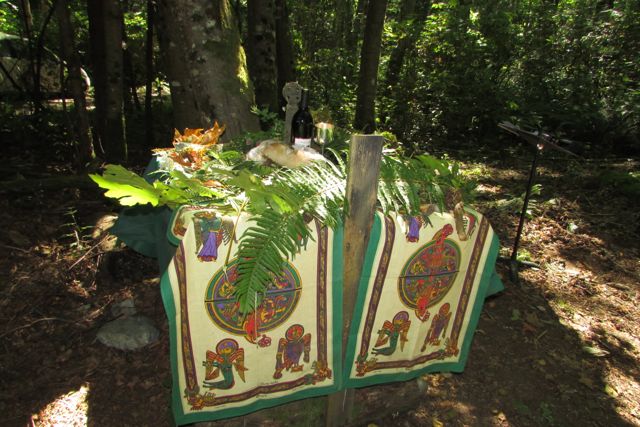
Our altar made from gathered objects
Sending prayer
God you formed all creation to live in perfect harmony.
You wove all life into intricately connected ecosystems.
Linked, interacting, interdependent.
When that harmony was broken,
You sent your son to reconcile all things to yourself,
To transform brokenness into wholeness.
Let us see the harmony of our Creator,
And drink in the wonder of Christ’s sacrifice,
Let us eat of the fruits of the reconciling Spirit,
And work to restore God’s peace and wholeness.
Let us build together in a spirit of unity, and reconciliation.
Song
Go out to collect items to decorate the altar.
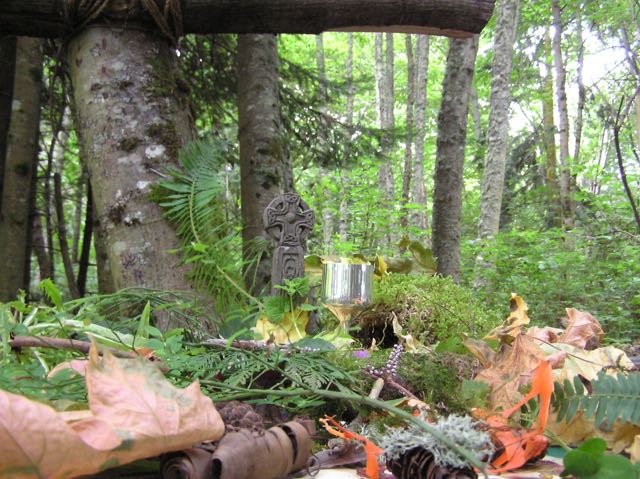
Its the last day to register online for the retreat on Saturday. You can still register on site Saturday.
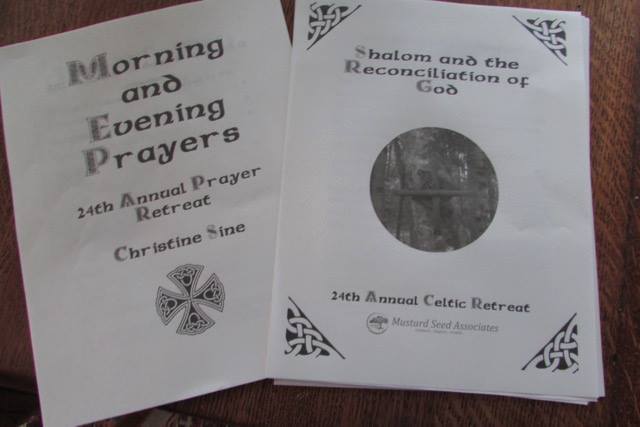
The programmes are ready, and today I am working on cutting out finger labyrinth templates for afternoon activities and all the last minute shopping details.
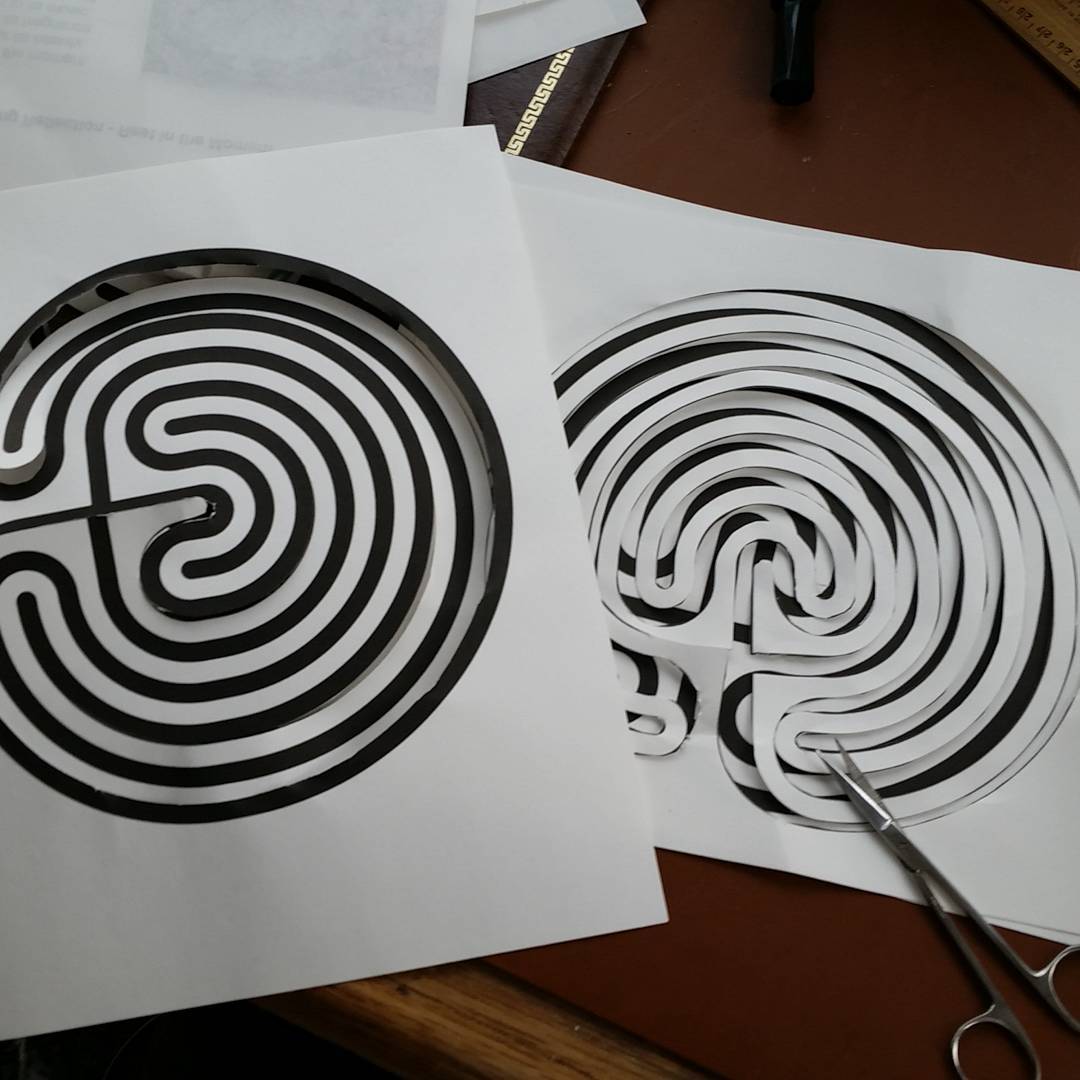
Directions and suggested things to bring will be posted on the retreat page tomorrow if you still have not made up your mind!
Hope that you come, there is always room for one more!
As an Amazon Associate, I receive a small amount for purchases made through appropriate links.
Thank you for supporting Godspace in this way.
When referencing or quoting Godspace Light, please be sure to include the Author (Christine Sine unless otherwise noted), the Title of the article or resource, the Source link where appropriate, and ©Godspacelight.com. Thank you!

